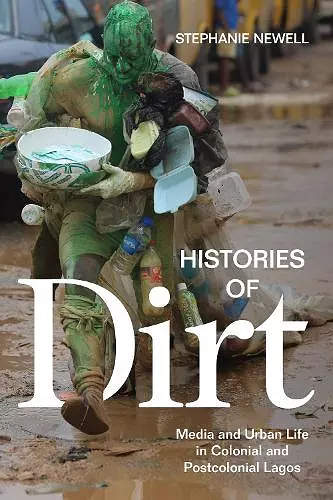Histories of Dirt
Media and Urban Life in Colonial and Postcolonial Lagos
Format:Paperback
Publisher:Duke University Press
Published:20th Dec '19
Should be back in stock very soon

In Histories of Dirt Stephanie Newell traces the ways in which urban spaces and urban dwellers come to be regarded as dirty, as exemplified in colonial and postcolonial Lagos. Newell conceives dirt as an interpretive category that facilitates moral, sanitary, economic, and aesthetic evaluations of other cultures under the rubric of uncleanliness. She examines a number of texts ranging from newspaper articles by elite Lagosians to colonial travel writing, public health films, and urban planning to show how understandings of dirt came to structure colonial governance. Seeing Lagosians as sources of contagion and dirt, British colonizers used racist ideologies and discourses of dirt to justify racial segregation and public health policies. Newell also explores possibilities for non-Eurocentric methods for identifying African urbanites’ own values and opinions by foregrounding the voices of contemporary Lagosians through interviews and focus groups in which their responses to public health issues reflect local aesthetic tastes and values. In excavating the shifting role of dirt in structuring social and political life in Lagos, Newell provides new understandings of colonial and postcolonial urban history in West Africa.
"Stephanie Newell's Histories of Dirt does for this generation what Mary Douglas did with Purity and Danger several decades ago. Focusing on what seems ubiquitous and thus utterly banal—dirt—Newell shows how the phenomenon of dirt is interpretable from a variety of sometimes contradictory perspectives both by local Africans and by the team of researchers that set about investigating the phenomenon. This is a high-order interdisciplinary work, full of fresh insights and with a turn toward what Africans think about themselves that will provide salutary methodological and conceptual lessons for scholars in African Studies and well beyond." -- Ato Quayson, Stanford University
“Brilliantly reading imperial discourse against the grain, Stephanie Newell offers compelling dissections of the perspectives, assumptions, privileged subject positions, and framings that characterize imperial thought. At the same time, she gives close attention and consideration to the range of voices of the people of Lagos, producing powerful arguments about the popular, cultural, and social structures that express urban values. With great ingenuity, Newell has constituted an archive of the present that provides local voices and views on subjects initially warped by colonial discourse. Histories of Dirt is an important and major contribution.” -- Kenneth W. Harrow, author of * Trash: African Cinema from Below *
"Histories of Dirt is a work of great creativity and nuance, and its message is especially urgent today. 'Èkó ò ní bàjé,' goes a political slogan turned popular now—Lagos will not spoil."
-- Samuel Fury Childs Daly * International Journal of African Historical Studies *
"The book is noteworthy for its contribution to our knowledge of how modernity has evolved in African cities, in a period over a century, a process illustrated through the histories of dirt in the city of Lagos. It is certainly useful to all those interested in the political and social history of cities and urban planning in Africa." -- Carlos Nunes Silva * Planning Perspectives *
"Newell's prose is lucid and not belabored with theoretical jargons.… The book is also a huge contribution to postcolonial studies and public health. The most recent example through which we can come to terms with Newell on this cutting-edge scholarship is in the wake of the COVID-19 pandemic, in which different world leaders and citizens invoke dirt rhetoric against Asian bodies." -- Olájídé Salawu * Cambridge Journal of Postcolonial Literary Inquiry *
“Histories of Dirt is a helpful manual for how dirt, as a word, an object, and a discourse, can be used to constitute archives, influence public opinion, and spark imagination.” -- Ainehi Edoro-Glines * Journal of African History *
"Histories of Dirt is a formidable accomplishment of interdisciplinary scholarship and storytelling. . . . The book is exemplary for the fluidity of its narrative arc, for its methodological reflexivity, for its detailed attention to vernacular language, and for its richly textured, polyphonic portrait of Lago as a (post)colonial metropolis." -- Fabien Cante * Africa *
ISBN: 9781478006435
Dimensions: unknown
Weight: 408g
272 pages